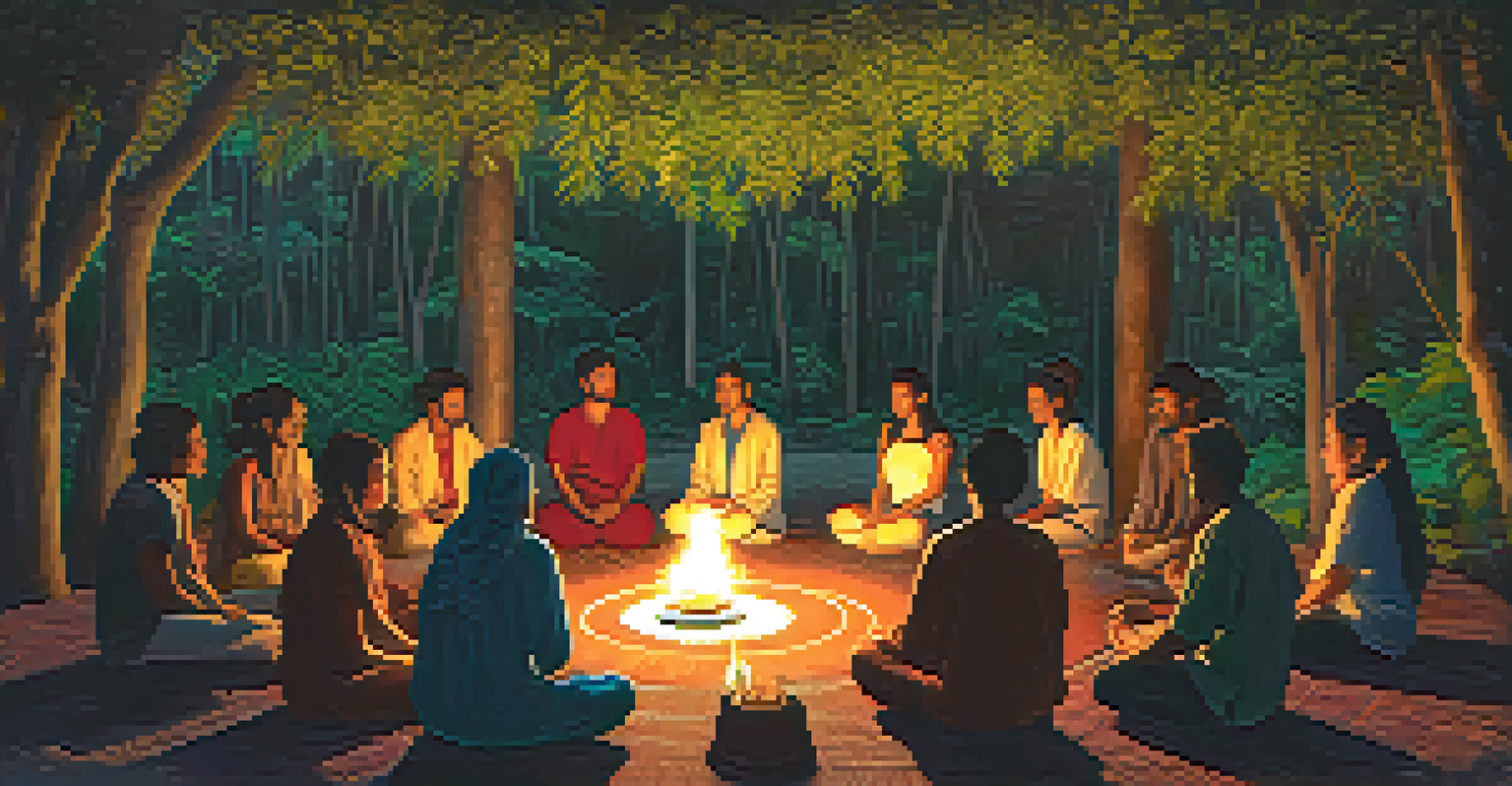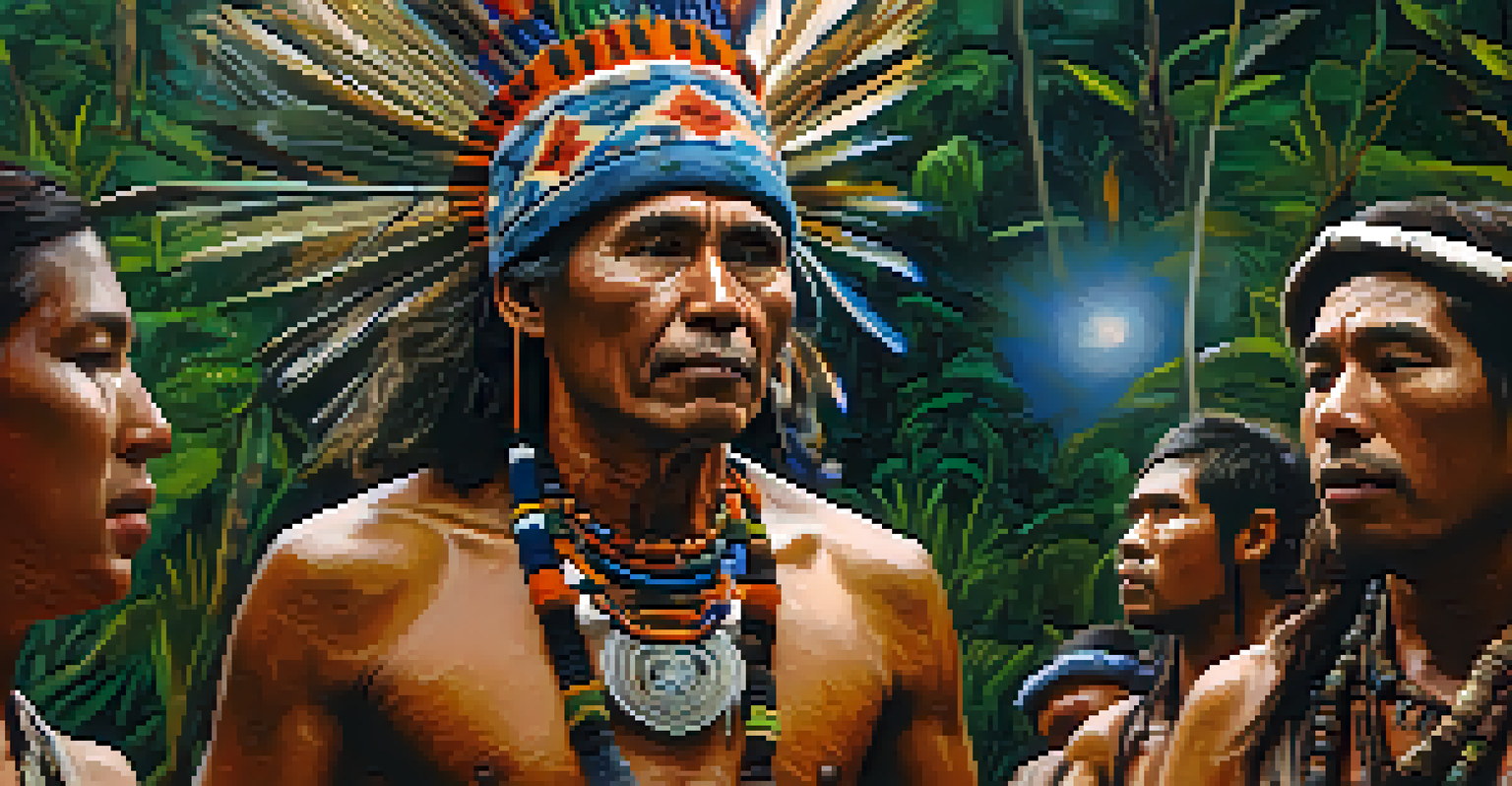How Ayahuasca Facilitates Emotional Connections Among Groups

Understanding Ayahuasca and Its Cultural Significance
Ayahuasca is a traditional Amazonian brew made from the Banisteriopsis caapi vine and other plants. It has been used for centuries by indigenous tribes for spiritual healing and connection. This ritualistic use has created a rich cultural tapestry around Ayahuasca, highlighting its therapeutic potential in modern society.
The journey of self-discovery is not a solitary one; it is a shared experience that connects us to each other and the world around us.
The brew is known for its psychoactive properties, primarily due to a compound called DMT. When consumed, it can induce profound experiences that often lead to self-reflection and emotional release. This journey into one’s psyche can help participants better understand their emotions and relationships.
As more people seek deeper connections and healing, Ayahuasca ceremonies have gained popularity beyond the Amazon. Many view these gatherings as a space for community, healing, and transformation, where individuals can explore their inner selves together.
Creating Safe Spaces for Vulnerability
One of the most crucial aspects of Ayahuasca ceremonies is the creation of a safe space. Participants are encouraged to be vulnerable and express their emotions without judgment. This safe environment fosters trust and openness, essential ingredients for emotional connection.

Facilitators often set clear intentions for the ceremony, guiding participants on how to engage with one another. This communal approach helps individuals feel supported as they navigate their emotional landscapes. When people feel safe, they are more likely to share their experiences and feelings.
Ayahuasca's Cultural Healing Power
Ayahuasca serves as a profound tool for spiritual healing and emotional connection, deeply rooted in Amazonian traditions.
The sense of community built during these sessions can be incredibly powerful. As participants witness each other's journeys, they often form bonds that transcend the superficial connections found in everyday life.
Shared Experiences and Collective Healing
During Ayahuasca ceremonies, individuals often undergo intense experiences that can lead to catharsis. Sharing these experiences with others can create a powerful sense of unity among participants. This collective journey enhances emotional ties, as everyone navigates their struggles together.
In the midst of chaos, there is often a profound sense of community that emerges, reminding us that we are all in this together.
When participants share their insights and breakthroughs, it fosters empathy and understanding. Hearing someone else's story can resonate deeply, allowing individuals to reflect on their own paths. This shared narrative is a catalyst for emotional connection, making each person's journey a communal experience.
As participants support one another, they often find themselves feeling more connected, not just to each other but to humanity as a whole. This collective healing reinforces the idea that we are all in this together, creating a sense of belonging.
Facilitating Deep Conversations and Reflection
Ayahuasca often catalyzes deep conversations that might not happen in ordinary settings. The brew can strip away social barriers, encouraging participants to explore their feelings and thoughts on a profound level. These conversations can lead to greater emotional intimacy among group members.
Participants often engage in discussions about their fears, dreams, and past traumas. This level of openness can be transformative, leading to a deeper understanding of oneself and others. Such dialogues strengthen bonds, as individuals feel seen and heard.
Creating Safe Spaces for Sharing
The success of Ayahuasca ceremonies relies on fostering a safe environment where participants can express vulnerability and build trust.
Moreover, these meaningful exchanges can spark lasting friendships. When people share their vulnerabilities, it creates a foundation of trust that can flourish long after the ceremony ends.
The Role of Music and Ritual in Connection
Music plays a pivotal role in Ayahuasca ceremonies, often enhancing the emotional experience. Traditional songs, known as icaros, are sung by shamans to guide participants through their journeys. These melodies can evoke deep feelings, further connecting individuals within the group.
Rituals accompanying the ceremony also contribute to a sense of belonging. Participants share in collective practices, creating a rhythm that binds them together. This shared experience fosters a sense of unity, as everyone is engaged in a common purpose.
The combination of music, rituals, and shared intentions creates a unique atmosphere where emotional connections can thrive. Participants often leave the ceremony feeling a profound attachment to one another, strengthened by the intertwining of their experiences.
Integration: Maintaining Connections Post-Ceremony
The journey doesn't end when the Ayahuasca ceremony is over. Integration is a crucial process where participants reflect on their experiences and apply insights to their daily lives. This phase often involves continued communication with fellow participants, fostering ongoing connections.
Many groups establish support networks or meet regularly to discuss their journeys. This ongoing engagement helps individuals maintain the emotional bonds formed during the ceremony. Sharing progress and challenges can enhance feelings of solidarity and encouragement.
Importance of Integration After Ceremonies
Post-ceremony integration is vital for maintaining connections and applying insights gained during the Ayahuasca experience to everyday life.
Integration workshops and follow-up gatherings can further deepen these connections. Participants often find strength in community as they navigate life’s hurdles together, reinforcing the importance of shared healing.
The Science Behind Emotional Connection in Ayahuasca Groups
Research has started to uncover the science behind the emotional connections formed during Ayahuasca ceremonies. Studies suggest that the experiences induced by Ayahuasca can lead to changes in brain function, promoting emotional regulation and empathy. This neurological shift can enhance participants' ability to connect with others.
Moreover, the emotional release experienced during these ceremonies can create a lasting impact on relationships. Participants often report feeling more compassionate and understanding towards others, reinforcing their emotional bonds. This shift can lead to healthier interactions in their everyday lives.

As science continues to explore the effects of Ayahuasca, we may gain deeper insights into how shared experiences can foster emotional connections. Understanding these mechanisms can further legitimize the role of Ayahuasca in therapeutic and communal settings.